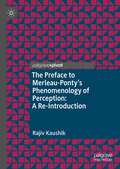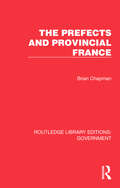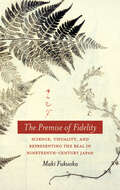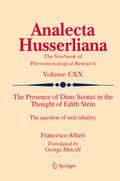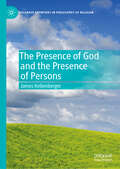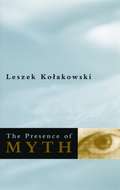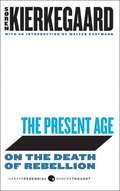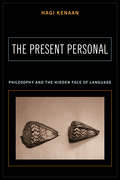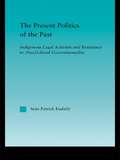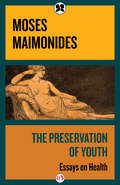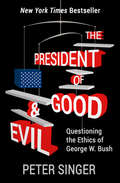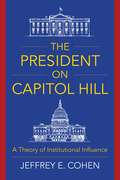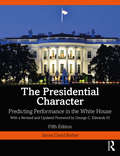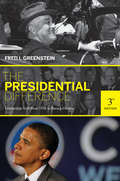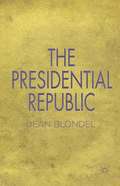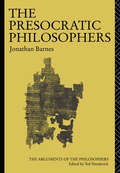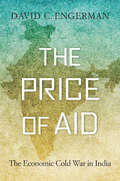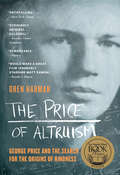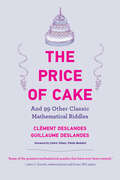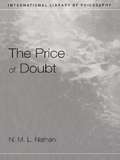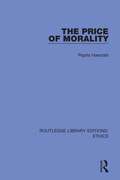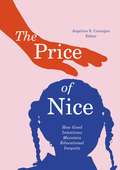- Table View
- List View
The Predictioneer's Game: Using the Logic of Brazen Self-Interest to See and Shape The Future
by Bruce Bueno de MesquitaGame theory is a fancy label for a simple idea: People compete, and they always do what they think is in their own best interest. A master practitioner whose forecasts have an amazing 90 percent accuracy rate, Bruce Bueno de Mesquita uses game theory and its insights into human behavior to predict and even engineer political, financial, and personal events. In this revelatory book, he shares his methods. Bueno de Mesquita games a range of high-stakes negotiations and conflicts, from the North Korean disarmament talks to the Middle East peace process; provides successful strategies to combat both global warming and terror; and shows how game theory can help you in your own life, whether you want to succeed in a lawsuit, elect the CEO of your company, or simply buy a car. Savvy and shockingly effective, The Predictioneer's Game will change how you understand the world and manage your future. Life's game, and how you play is whether you win or lose. Book jacket.
The Preface to Merleau-Ponty's Phenomenology of Perception: A Re-Introduction
by Rajiv KaushikThis book offers a critical re-appraisal of what is perhaps Merleau-Ponty’s most widely read text, the Preface to his Phenomenology of Perception. Although open and enigmatic text, the Preface is still often used to introduce phenomenology in general and Merleau-Ponty’s work specifically to students, scholars in disciplines other than philosophy, and art practitioners. Taking advantage of the fact that many of his course notes have been posthumously published in the last few decades, this book situates the Preface to the Phenomenology of Perception in the context of Merleau-Ponty's later work and shows how it contains many of the threads on which Merleau-Ponty would later pull. In doing so, the book chapters elaborate key themes in the Preface: “Phenomenology and its Paradoxes,” “Phenomenology and its Method,” “Phenomenology and its Incompletion,” “Phenomenology and Non-Phenomenology." Readers will learn about the radicality of Merleau-Ponty’s early articulation of phenomenology, how much it already suggests the profound transformation of phenomenology usually associated with his more mature work.
The Prefects and Provincial France (Routledge Library Editions: Government)
by Brian ChapmanOriginally published in 1955, this book traces the history of the Corps from its foundation in 1800, the successive stages in the career of a Prefect, his or her legal powers and influence on the social, political and economic life of the country. As well as being an original piece of research, it provides an absorbing picture of life in provincial France and explains the fundamental strength of France despite her political contradictions.
The Premise of Fidelity: Science, Visuality, and Representing the Real in Nineteenth-century Japan
by Maki FukuokaThe Premise of Fidelityputs forward a new history of Japanese visuality through an examination of the discourses and practices surrounding the nineteenth century transposition of "the real" in the decades before photography was introduced. This intellectual history is informed by a careful examination of a network of local scholars-from physicians to farmers to bureaucrats-known as Shohyaku-sha. In their archival materials, these scholars used the termshashin(which would, years later, come to signify "photography" in Japanese) in a wide variety of medical, botanical, and pictorial practices. These scholars pursued questions of the relationship between what they observed and what they believed they knew, in the process investigating scientific ideas and practices by obsessively naming and classifying, and then rendering through highly accurate illustration, the objects of their study. This book is an exploration of the process by which the Shohyaku-sha shaped the concept of shashin. As such, it disrupts the dominant narratives of photography, art, and science in Japan, providing a prehistory of Japanese photography that requires the accepted history of the discipline to be rewritten.
The Presence of Duns Scotus in the Thought of Edith Stein
by Francesco AlfieriThis book examines the phenomenological anthropology of Edith Stein. It specifically focuses on the question which Stein addressed in her work Finite and Eternal Being: What is the foundational principle that makes the individual unique and unrepeatable within the human species? Traditional analyses of Edith Stein's writings have tended to frame her views on this issue as being influenced by Aristotle and Thomas Aquinas, while neglecting her interest in the lesser-known figure of Duns Scotus. Yet, as this book shows, with regard to the question of individuality, Stein was critical of Aquinas' approach, finding that of Duns Scotus to be more convincing. In order to get to the heart of Stein's readings of Duns Scotus, this book looks at her published writings and her personal correspondence, in addition to conducting a meticulous analysis of the original codexes on which her sources were based. Written with diligence and flair, the book critically evaluates the authenticity of Stein's sources and shows how the position of Scotus himself evolved. It highlights the originality of Stein's contribution, which was to rediscover the relevance of Mediaeval scholastic thought and reinterpret it in the language of the Phenomenological school founded by Edmund Husserl.
The Presence of God and the Presence of Persons (Palgrave Frontiers in Philosophy of Religion)
by James KellenbergerThis book treats the presence of God and the presence of persons. The experience of the presence of God is a well-recognized religious experience in theistic traditions. The experience of the presence of persons, this book argues, is an analogous moral experience. As it is possible for individuals to come into the presence of God – to have this phenomenal experience – so it is possible for them to come into the presence of persons.Kellenberger explores how coming into the presence of persons is structurally analogous with coming into the presence of God. Providing a highly focused analysis of the two seemingly distinct concepts, normally thought to fall under different subfields of philosophy, the chapters carefully draw paralells between them. Kellenberger then goes on show how, analogous to “the death of God,” a loss of the consciousness of the reality of God and his presence, is a “death of persons”, felt as a loss of the sense of the inherent worth of persons and their presence. This volume finishes with an examination of the concrete moral and religio-ethical implications of coming into the presence of persons, and in particular the implications of coming into the presence of all persons.
The Presence of Myth
by Leszek Kolakowski"[An] important essay by a philosopher who more convincingly than any other I can think of demonstrates the continuing significance of his vocation in the life of our culture."—Karsten Harries, The New York Times Book Review With The Presence of Myth, Kolakowski demonstrates that no matter how hard man strives for purely rational thought, there has always been-and always will be-a reservoir of mythical images that lend "being" and "consciousness" a specifically human meaning. "Kolakowski undertakes a philosophy of culture which extends to all realms of human intercourse—intellectual, artistic, scientific, and emotional. . . . [His] book has real significance for today, and may well become a classic in the philosophy of culture."—Anglican Theological Review
The Present Age: On the Death of Rebellion
by Soren KierkegaardThe Author says that Christianity was from the start essentially authoritarian--not just that the Catholic Church was,or that Calvin was,or Luther, or,regrettably, most of the Christian churches.Indeed, though Kierkegaard was, and wished to be, an individual, and even said that on his tombstone he would like no other epitaph than 'That Individual, ' his protest against his age was centred in his lament over the loss of authority.
The Present Personal: Philosophy and the Hidden Face of Language
by Hagi KenaanIs philosophy deaf to the sound of the personal voice? While philosophy is experienced at admiring, resenting, celebrating, and, at times, renouncing language, philosophers have rarely succeeded in being intimate with it. Hagi Kenaan argues that philosophy's concern with abstract forms of linguistic meaning and the objective, propositional nature of language has obscured the singular human voice. In this strikingly original work Kenaan explores the ethical and philosophical implications of recognizing and responding to the individual presence in language.In pursuing the philosophical possibility of listening to language as the embodiment of the human voice, Kenaan explores the phenomenological notion of the "personal." He defines the personal as the irresolvable tension that exists between the public character of language, necessary for intelligibility, and the ways in which we, as individuals, remain riveted to our words in a contingently singular manner.The Present Personal fuses phenomenology and aesthetics and the traditions of Continental and Anglo-American philosophy, drawing on Wittgenstein, J. L. Austin, Kant, Kierkegaard, and Heidegger as well as literary works by Kafka, Kundera, and others. By asking new questions and charting fresh terrain, Kenaan does more than offer innovative investigations into the philosophy of language; The Present Personal, and its concern with the intimate and personal nature of language, uncovers the ethical depth of our experience with language.Kenaan begins with a discussion of Kierkegaard's existential critique of language and the ways in which the propositional structure of language does not allow the spoken to reflect the singularity of the self. He then compares two attempts to subvert the "hegemony of content": the pragmatic turn of J. L. Austin and the poetic path of Heidegger. Kenaan concludes by turning to Kant and discovering an analogy between the experience of meaning in language and the aesthetic experience of encountering beauty. Kenaan's reconceptualization of philosophy's approach to language frees the contingent singularity of language while, at the same time, permitting it to continue to dwell within the confines of content.
The Present Politics of the Past: Indigenous Legal Activism and Resistance to (Neo)Liberal Governmentality (Indigenous Peoples and Politics)
by Seán Patrick EudailyThis work applies Jacques Derrida's framework of "spectropolitics" to (post)coloniality in order to investigate the emergence of indigenous peoples' movements, advances a poststructural approach to the analysis of liberal politics based upon the historical sociology of Michel Foucault, and critically engages the literatures on ethnic politics, critical legal studies, and multicultural democracy. In addition, two historical case dossiers (the Mabo v. Queensland decision and its aftermath in Australia; and the diverse legal strategies of First Nations activism in Canada following the Delgamuukw v. B.C. decision) focus on the "strategic space" in which new indigenous political identities are produced and performed.
The Preservation of Youth: Essays on Health
by Moses MaimonidesBased on his Jewish faith, Maimonides fused neo-Aristotelian philosophy with the Jewish legal tradition into a systemic whole. In his main philosophic work, The Guide for the Perplexed, he attempted to appeal to rationalists troubled by the personal embodiment of God in the biblical accounts. It is in that rational spirit that he provided a strikingly modern work to be used by patients and practicing physicians alike. Capitalizing on his vast practical experience as a physician, combined with his knowledge of classical and medieval principles of healing, Maimonides was able to provide a comprehensive theory for the therapy of body and mind. In this work he describes many conditions including asthma, diabetes, hepatitis and pneumonia. He includes recommendations on many aspects for a healthy life which are still applicable today. Included are suggestions on diet and exercise, sex life and the underlying psychological causes of illness.
The Preservation of Youth: Essays on Health
by Moses MaimonidesBased on his Jewish faith, Maimonides fused neo-Aristotelian philosophy with the Jewish legal tradition into a systemic whole. In his main philosophic work, The Guide for the Perplexed, he attempted to appeal to rationalists troubled by the personal embodiment of God in the biblical accounts. It is in that rational spirit that he provided a strikingly modern work to be used by patients and practicing physicians alike. Capitalizing on his vast practical experience as a physician, combined with his knowledge of classical and medieval principles of healing, Maimonides was able to provide a comprehensive theory for the therapy of body and mind. In this work he describes many conditions including asthma, diabetes, hepatitis and pneumonia. He includes recommendations on many aspects for a healthy life which are still applicable today. Included are suggestions on diet and exercise, sex life and the underlying psychological causes of illness.
The President of Good & Evil: Questioning the Ethics of George W. Bush
by Peter SingerFrom the author of Animal Liberation, an examination of the chasm between the words and actions of George W. Bush, who claimed the moral high ground more than any president in recent US history During his time in public office, George W. Bush framed a striking number of his major policies and initiatives with the concepts of good and evil. From his christening of the "axis of evil" to the wars in the Middle East to his condemnation of stem cell research, Bush consistently deployed moral language in discussions of the day's major issues. But to what degree could his moral philosophy be considered coherent? In The President of Good & Evil, Peter Singer offers an eye-opening analysis of the ethical outlook of America's forty-third president. This ebook features an illustrated biography of Peter Singer, including rare photos from the author's personal collection.
The President on Capitol Hill: A Theory of Institutional Influence
by Professor Jeffrey E. CohenCan presidents influence whether Congress enacts their agenda? Most research on presidential-congressional relations suggests that presidents have little if any influence on Congress. Instead, structural factors like party control largely determine the fate of the president’s legislative agenda. In The President on Capitol Hill, Jeffrey E. Cohen challenges this conventional view, arguing that existing research has underestimated the president’s power to sway Congress and developing a new theory of presidential influence.Cohen demonstrates that by taking a position, the president converts an issue from a nonpresidential into a presidential one, which leads members of Congress to consider the president’s views when deciding how to vote. Presidential position taking also converts the factors that normally affect roll call voting—such as party, public opinion, and policy type—into resources that presidents can leverage to influence the vote. By testing all House roll calls from 1877 to 2012, Cohen finds that not only do presidents have more influence than previously thought, but through their influence, they can affect the substance of public policy. The President on Capitol Hill offers a new perspective on presidential-congressional relations, showing that presidents are not simply captives of larger political forces but rather major players in the legislative process.
The Presidential Character: Predicting Performance in the White House, With a Revised and Updated Foreword by George C. Edwards III
by James David BarberA book entitled The Presidential Character is more timely and necessary than ever. This new issue of James David Barber’s classic work appears almost 50 years after its first publication and yet reads like a roadmap to the 2020 presidential election. Its subtitle, “Predicting Performance in the White House,” is an apt reflection on the election of 2016. With a revised and updated foreword by George C. Edwards III that brings in the Trump Administration, this book argues that patterns in a person’s character, world view, and political style can allow us to anticipate his or her performance as president. How would Barber have categorized Donald J. Trump, who appears to defy every presidential type and norm? This question suggests one of the most provocative and appealing reasons for students, scholars, and voters to re-read The Presidential Character at this particular juncture. What should we look for in a president? This text offers explanations and predictions of the performance of past presidents and presidential candidates with many cautionary tales looking forward. Features Presents a revised and updated foreword by presidential scholar George C. Edwards III, Distinguished Professor of Political Science at Texas A&M University, that includes the advent of the Trump Administration and highlights the book’s classic and enduring contributions. Includes predictions of presidential performance from Nixon to Bush. Analyzes the media’s role in providing information about the political candidates and in shaping public opinion of them. Draws on historical, biographical, and psychological research to help voters make judicious choices in determining the country’s highest leaders. Encourages citizens to be actively involved scholars, critics, and participants in their government.
The Presidential Difference: Leadership Style from FDR to Barack Obama
by Fred I. GreensteinFred I. Greenstein has long been one of our keenest observers of the modern presidency. In The Presidential Difference, he provides a fascinating and instructive account of the presidential qualities that have served well and poorly in the Oval Office, beginning with Franklin D. Roosevelt's first hundred days. He surveys each president's political skill, vision, cognitive style, organizational capacity, ability to communicate, and emotional intelligence--and argues that the last is the most important in predicting presidential success. Throughout, Greenstein offers a series of bottom-line judgments on each of his thirteen subjects as well as an overarching theory of why presidents succeed or fail. In this new edition, Greenstein assesses President George W. Bush in the wake of his two terms. The book also includes a new chapter on the leadership style of President Obama and how we can expect it to affect his presidency and legacy.
The Presidential Republic
by Jean BlondelThis study presents the presidential republic as the most widespread form of government in the contemporary world and looks at the countries which pioneered that development. It assesses the development of presidential republics and looks as the variety of national arrangements and practices, whose common characteristics are to constitute 'presidential republics', and the positioning of this regime alongside monarchies and parliamentary republics. It also addresses the part played by presidential leadership in helping to legitimise the regimes of the new countries. Offering an insight into presidential republics across Latin America, Africa and the Ex-soviet union, this text is a seminal work on political regimes and essential reading for all students and scholars with an interest in political institutions and leadership world-wide.
The Presocratic Philosophers
by G. S. Kirk J. E. Raven M. SchofieldBeginning with a long and extensively rewritten introduction surveying the predecessors of the Presocratics, this book traces the intellectual revolution initiated by Thales in the sixth century B. C. to its culmination in the metaphysics of Parmenides and the complex physical theories of Anaxagoras and the Atomists in the fifth century it is based on a selection of some six hundred texts, in Greek and a close English translation which in this edition is given more prominence. These provide the basis for a detailed critical study of the principal individual thinkers of the time. Besides serving as an essential text for undergraduate and graduate courses in Greek philosophy and in the history of science, this book will appeal to a wide range of readers with interests in philosophy, theology, the history of ideas and of the ancient world, and indeed to anyone who wants an authoritative account of the Presocratics.
The Presocratic Philosophers (Arguments of the Philosophers)
by Jonathan BarnesThe Presocratics were the founding fathers of the Western philosophical tradition, and the first masters of rational thought. This volume provides a comprehensive and precise exposition of their arguments, and offers a rigorous assessment of their contribution to philosophical thought.
The Price of Aid: The Economic Cold War in India
by David C. EngermanThis study of US and Soviet aid efforts in India during the Cold War &“makes a major contribution towards a necessary discussion of the politics of aid&” (Times Higher Education). Debates over foreign aid are often strangely ahistorical. Economists argue about how to make aid work while critics bemoan money wasted on corruption, ignoring the fundamentally political character of aid. The Price of Aid turns the standard debate on its head. By exposing the geopolitical calculus underpinning development assistance, it also exposes its costs. India stood at the center of American and Soviet aid competition throughout the Cold War, as both superpowers saw developmental aid as a way of pursuing their geopolitical goals by economic means. Drawing on recently declassified files from seven countries, David Engerman shows how Indian leaders used Cold War competition to win battles at home, eroding the Indian state in the process. As China spends freely in Africa, the political stakes of foreign aid are rising once again.&“A superb, field-changing book . . . A true classic.&” —Sunil Amrith
The Price of Altruism: George Price and the Search for the Origins of Kindness
by Oren Harman"Enthralling."--Frans de Waal, The New York Times Book Review Survival of the fittest or survival of the nicest? Since the dawn of time man has contemplated the mystery of altruism, but it was Darwin who posed the question most starkly. From the selfless ant to the stinging bee to the man laying down his life for a stranger, evolution has yielded a goodness that in theory should never be. Set against the sweeping tale of 150 years of scientific attempts to explain kindness, The Price of Altruism tells for the first time the moving story of the eccentric American genius George Price (1922-1975), as he strives to answer evolution's greatest riddle. An original and penetrating picture of twentieth century thought, it is also a deeply personal journey. From the heights of the Manhattan Project to the inspired equation that explains altruism to the depths of homelessness and despair, Price's life embodies the paradoxes of Darwin's enigma. His tragic suicide in a squatter's flat, among the vagabonds to whom he gave all his possessions, provides the ultimate contemplation on the possibility of genuine benevolence.
The Price of Cake: And 99 Other Classic Mathematical Riddles
by Clément Deslandes Guillaume DeslandesIngeniously designed mathematical riddles to delight armchair—and seasoned—mathematicians, in high school and beyond.In The Price of Cake, brothers Clément and Guillaume Deslandes have assembled a uniquely rich and accessible collection of mathematical riddles, organized by difficulty and accompanied by unique hand-drawn illustrations. The challenges are exceptional in both their range and their precision. There are no &“tricks&” here—just good math to test your skills. While any student will be thrilled to encounter fresh presentations of classic conundrums such as Simpson&’s paradox, Hilbert's infinite hotel, Monty Hall&’s paradox, and Seven Bridges of Königsberg, seasoned solvers will also appreciate challenging original puzzles using the Axiom of Choice and Conway&’s Soldiers problem. The Deslandes&’ lucid and elegant solutions offer new insights, as they seamlessly connect the skills applied in each problem to broader theoretical revelations. Moreover, as Fields Medalist Cédric Villani writes in his preface, these riddles are much more than just exercises. They capture &“a certain dose of decorum and mystery,&” and to decipher them will require both imagination and tenacity. To aid you on this journey, the authors provide hints to each puzzle, detailed proofs and solutions, and a series of Math Refreshers to revisit important concepts that are used to arrive at those answers. Entertaining and rigorous in equal measure, The Price of Cake is bound to captivate mathematics enthusiasts and students of all levels.
The Price of Doubt (International Library of Philosophy)
by Nicholas NathanFirst Published in 2004. Routledge is an imprint of Taylor & Francis, an informa company.
The Price of Morality
by Pepita HaezrahiOriginally published in 1961, this book defines the specific traits and describes the concrete qualities of moral action. It denotes the boundaries and discusses the conflicts which arise between the aims of moral goodness and those of pure religiosity, personal and historic grandeur and creative excellence. The theories of theologians like Barth and Brunner among others, and the maximalist theories of Nietzsche and his disciples and certain existentialists are contrasted with Kant’s essay on pure ethics.
The Price of Nice: How Good Intentions Maintain Educational Inequity
by Angelina E. CastagnoHow being &“nice&” in school and university settings works to reinforce racialized, gendered, and (dis)ability-related inequities in education and society Being nice is difficult to critique. Niceness is almost always portrayed and felt as a positive quality. In schools, nice teachers are popular among students, parents, and administrators. And yet Niceness, as a distinct set of practices and discourses, is not actually good for individuals, institutions, or communities because of the way it maintains and reinforces educational inequity. In The Price of Nice, an interdisciplinary group of scholars explores Niceness in educational spaces from elementary schools through higher education to highlight how this seemingly benign quality reinforces structural inequalities. Grounded in data, personal narrative, and theory, the chapters show that Niceness, as a raced, gendered, and classed set of behaviors, functions both as a shield to save educators from having to do the hard work of dismantling inequity and as a disciplining agent for those who attempt or even consider disrupting structures and ideologies of dominance. Contributors: Sarah Abuwandi, Arizona State U; Colin Ben, U of Utah; Nicholas Bustamante, Arizona State U; Aidan/Amanda J. Charles, Northern Arizona U; Jeremiah Chin, Arizona State U; Sally Campbell Galman, U of Massachusetts; Frederick Gooding Jr., Texas Christian U; Deirdre Judge, Tufts U; Katie A. Lazdowski; Román Liera, U of Southern California; Sylvia Mac, U of La Verne; Lindsey Malcolm-Piqueux, California Institute of Technology; Giselle Martinez Negrette, U of Wisconsin–Madison; Amber Poleviyuma, Arizona State U; Alexus Richmond, Arizona State U; Frances J. Riemer, Northern Arizona U; Jessica Sierk, St. Lawrence U; Bailey B. Smolarek, U of Wisconsin–Madison; Jessica Solyom, Arizona State U; Megan Tom, Arizona State U; Sabina Vaught, U of Oklahoma; Cynthia Diana Villarreal, U of Southern California; Kristine T. Weatherston, Temple U; Joseph C. Wegwert, Northern Arizona U; Marguerite Anne Fillion Wilson, Binghamton U; Jia-Hui Stefanie Wong, Trinity College; Denise Gray Yull, Binghamton U.

